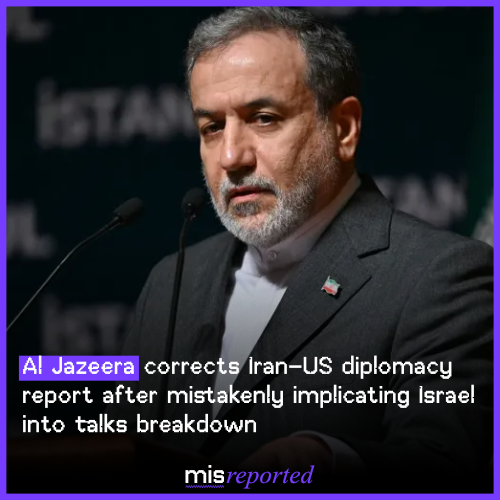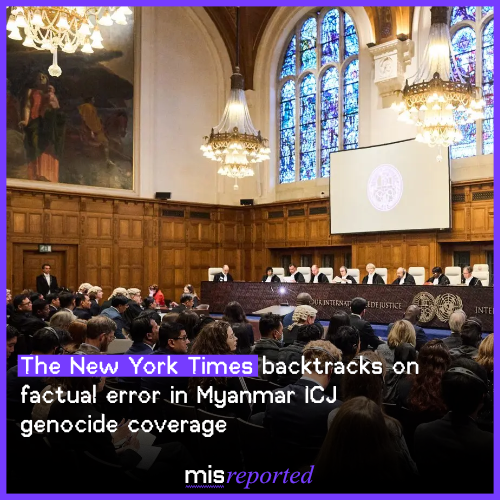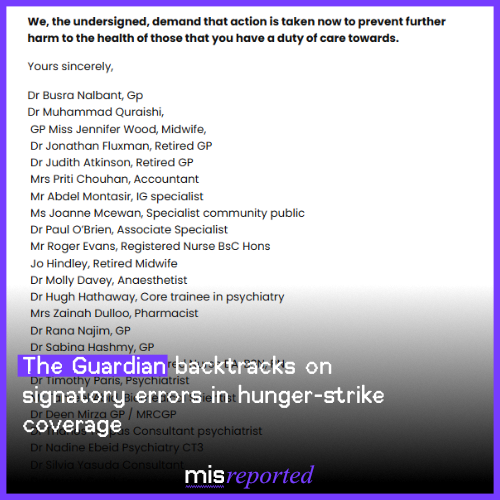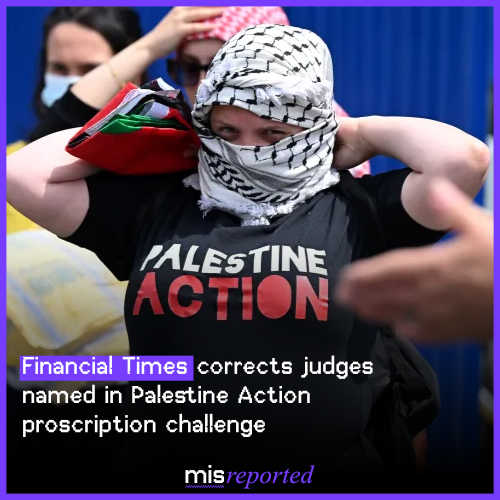
Al Jazeera corrects Iran-US diplomacy report after mistakenly implicating Israel into talks breakdown
Al Jazeera corrected a report after wrongly stating that US–Israel communication had broken down, when the reported suspension concerned US–Iran talks.
The error briefly suggested a major rupture in Washington’s relationship with Israel, a far more consequential claim than the reality later acknowledged.
The episode highlights how Israel is so routinely centred in Middle East coverage that it can be inserted even where it has no factual role, revealing bias through assumption rather than analysis.

The New York Times backtracks on factual error in Myanmar ICJ coverage
The New York Times corrected its ICJ reporting after misstating an allegation made against Myanmar.
The article wrongly referred to 54 houses being burned, rather than similar atrocities occurring across 54 villages.
The error illustrates how imprecise wording can distort the legal framing of genocide allegations.

The Guardian backtracks on signatory errors in hunger-strike coverage
The Guardian has clarified that the November hunger-strike letter was signed by about 100 medical professionals, not more than 800.
Earlier, it had implied that over 800 medical professionals had signed the November letter.
That distinction matters, because misframing advocacy figures risks stirring needless alarm by exaggerating professional consensus and misleading readers about the scale and timing of medical concerns in a sensitive public debate.

BBC amends protest coverage after downplaying violence associated with “intifada” slogans
The BBC altered its background explanation of “intifada” after criticism that it downplayed the violence historically associated with the term.
The original framing shaped how readers understood police action and Jewish concerns, while the amendment was issued quietly and without revisiting the broader narrative.
The episode reflects a wider pattern in which misreporting around Israel and antisemitism is corrected late and softly, leaving initial impressions largely intact.

BBC amends background wording on First Intifada in UK protest coverage
BBC corrected its reporting on background references to the First Intifada, clarifying that its earlier language did not provide a sufficiently complete or clear historical picture.
The original framing suggested a largely unarmed and benign uprising, which materially altered how readers would interpret the sensitivity and contemporary implications of the term.
That distinction matters, and misframing it risks undermining public trust, inflating narratives, or distorting accountability.

The Telegraph amends report on magistrate’s social media post after Oct 7 mischaracterisation
The Telegraph corrected an article after clarifying that a Hamas video shared by a magistrate did not contain language describing Israel as a cancer to be eradicated.
The original framing blurred the distinction between Hamas’s broader rhetoric and the specific content of the video in question.
That distinction matters, particularly in reporting on extremism, where precision determines whether scrutiny is evidence-based or overstated.

NewsGuard Corrects False AIPAC-ChatGPT Claim as Media Outlets Fail to Verify Viral Screenshot
NewsGuard corrected claims that ChatGPT displayed an AIPAC advertisement after finding the widely shared screenshot was fabricated.
The original reporting echoed a familiar pattern in which Israel-related allegations are amplified without standard verification checks.
That distinction matters, and misframing it risks undermining public trust, inflating narratives, or distorting accountability.

The Times removes Gaza image after concerns over misleading context
The Times removed a Gaza photograph and deleted related text after concerns were raised that the material lacked essential medical and operational context.
The original presentation encouraged readers to interpret the image as evidence of conflict-related starvation and violence without accommodating verified alternative explanations.
That distinction matters, and misframing it risks undermining public trust, inflating narratives, or distorting accountability.

The Guardian corrects detail in coverage of Palestine Action proscription hearing
The Guardian corrected its reporting on the High Court case involving Palestine Action by amending a spelling error in a named individual’s details.
The original coverage prioritised immediacy and narrative framing, contributing to a compressed account that left key legal and contextual distinctions underdeveloped.
That distinction matters, and misframing it risks undermining public trust, inflating narratives, or distorting accountability.

The New York Times corrects description of Israeli conditions for reopening Gaza border crossing
The New York Times corrected its reporting on the reopening of the Rafah crossing, clarifying that Israel said it would be opened in both directions once the remains of the final captives believed to be held in Gaza are returned.
The original framing implied that Israel was restricting the crossing independently of ceasefire conditions, materially altering how readers would interpret responsibility for the delay.
That distinction matters, and misframing it risks undermining public trust, inflating narratives, or distorting accountability.

Financial Times corrects judges named in Palestine Action proscription challenge
The Financial Times corrected an error identifying the judges assigned to hear the High Court challenge to the government’s proscription of Palestine Action.
While procedural, the mistake mattered in a case where judicial composition shapes expectations about how counterterrorism powers and protest rights will be tested.
The correction underlines how even small inaccuracies in legally sensitive reporting can erode confidence in coverage of contested political issues.

The New York Times corrects name of reservist in Binance lawsuit report
The New York Times has clarified that the Israel Defense Forces reservist cited in its Binance terrorism-finance lawsuit coverage was named Omer Balva, not Omar Balva.
Previously, it reported his given name incorrectly in an article on families suing Binance over alleged facilitation of funds for Hamas and other terrorist groups.
That distinction matters, and misframing it risks eroding confidence in the accuracy of conflict reporting, diminishing respect for individual victims and reinforcing concerns that high-stakes stories on this war are being corrected too quietly and too late.

Opinion: The BBC Asked for Patience. Fresh Data Shows Why It Won’t Get It.
A new analysis of BBC headline patterns has exposed a structural imbalance that the corporation can no longer explain away as coincidence. Over the past two years, headlines relating to Israel were three times more likely to frame the state as culpable than to apply equivalent scrutiny to Hamas. On its own, the dataset is limited. In the context of the BBC’s wider editorial crisis, it is diagnostic.

Opinion: The BBC’s Elevenfold Error and the Fragility of Trust
The BBC’s correction this week - reducing its report of 44,000 blocked aid pallets in Gaza to the actual figure of 4,000 - is remarkable not simply for its scale but for what it reveals. An eleven-fold exaggeration is an editorial malfunction of a type that alters the entire informational architecture of a story. In conflicts where numbers frame diplomatic argument, such inflation carries consequences well beyond the paragraph in which it first appeared.

The BBC corrects major exaggeration in reporting on blocked Gaza aid supplies
The BBC has clarified that 4,000 pallets of aid are blocked from entering Gaza, not 44,000 — an eleven-fold exaggeration in the original report.
Previously, its article portrayed an almost total humanitarian obstruction, based on a figure now acknowledged to be vastly overstated.
That distinction matters, and such exaggeration risks fuelling perceptions of bias, undermining confidence in conflict reporting, and weakening public trust when accuracy is most essential.
Opinion: South Africa’s Reality Is Complex - The Media Coverage Distorting It Is Simpler
South Africa’s leaders have discovered that the fastest way to deflect scrutiny is to accuse others of what they themselves stand accused of. The latest round of misreporting — and the quiet correction that followed — illustrates how easily parts of the Western press fall into line. Politico amended its coverage this week after misstating when Finance Minister Enoch Godongwana rejected claims of violence against white Afrikaners. The edit looked minor. Its implications were not.

Opinion: The Quiet Art of Correction and the Loud Politics of Error
The Guardian has clarified that one of the detainees described as still being held in the Rakefet facility had in fact been released under the October ceasefire agreement.
Previously, the article implied that both individuals represented by PCATI remained in custody, despite new information emerging after publication.
That distinction matters, and misframing it risks overstating the scale of current detentions, obscuring the legal status of specific cases, and reinforcing inaccurate narratives about the use of underground facilities.

Fox News corrects quote in coverage of violent Toronto attack amid rising antisemitism fears
Fox News has corrected its report on a violent anti-Israel attack in Toronto, removing an incorrectly attributed quote to the Simon Wiesenthal Center’s president.
Previously, the article included the statement in error, implying direct involvement from a major Jewish advocacy group.
That distinction matters, and misattributing quotes in coverage of politically charged antisemitic incidents risks amplifying confusion and undermining the credibility of those working to document and counter such violence.

Opinion: The BBC Collapses Under the Weight of Its Own Narratives
Tim Davie’s resignation as BBC director-general followed the exposure of a doctored Trump clip and mounting bias scandals in Gaza coverage.
Previously, the broadcaster dismissed accusations of manipulation as political noise.
That distinction matters, and ignoring it has now shown that misreporting news no longer brings reprimands — it brings resignations.

The Wall Street Journal corrects name of Israeli hostage advocacy group in report on return of Hadar Goldin’s remains
The Wall Street Journal has clarified that the advocacy group quoted is the Hostages and Missing Families Forum, not “Hostages Families Forum.”
Previously, the article misidentified the organization while reporting on the return of Lt. Hadar Goldin’s remains under the cease-fire deal.
That distinction matters, and misnaming the principal families’ body risks undermining their authority and confusing public understanding at a sensitive stage of hostage-and-remains exchanges.

